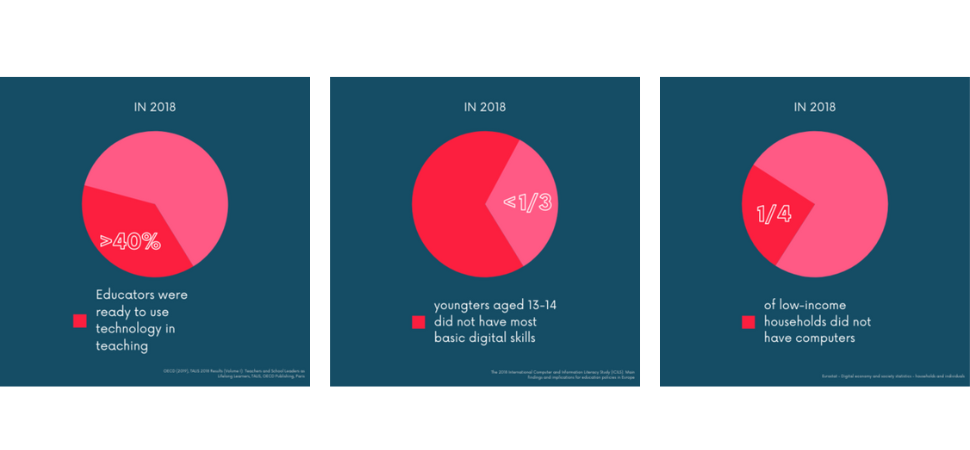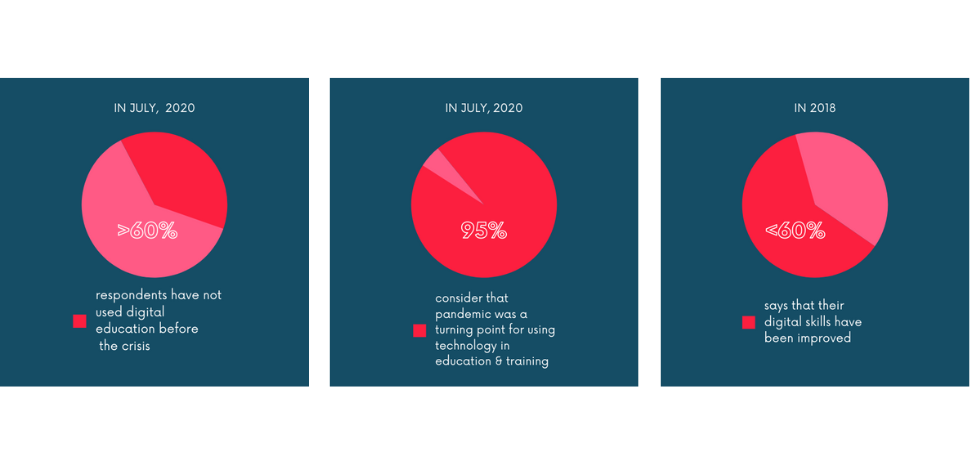Few years ago we started hearing about people who are doing workouts at home by watching videos, learning new languages by having online lessons, finishing one more college by enrolling in online classes without ever getting their foot at the door of the University. As much as I admire the possibilities of the technology, I never could imagine that everything could be done online.
Can school learning continue in the digital sphere?
Whenever I heard the words such as class and exam, I thought of a bunch of students sitting in the classroom, with only assistance of projectors and computers to raise the experience of education to a higher level.
It is now fairly known that we weren’t ready for the turnover of the world in the previous year, but in order to define what we can do now, we also have to look at how we have been doing until now.
Since education is necessary to each one of us whether we are passing chemistry exams or gaining new leadership skills I would like to briefly examine the adaption to the digital learning practice.
Here are some of the research from 2018 that were helpful in designing a new Education Action plan 2021-2027.

Statistically no one in 2018 was tech savvy enough for digital learning and if we look at the statistics after the pandemic, there are huge differences across the globe when it comes to digital education.
In July, 2020, some of the statistic of the public consultation were:

Overall opinion of the respondents is that online learning resources and content need to be more relevant, interactive and easy-to-use and not depend on the financial resources of a town or municipality.
It is easy to conclude that people are willing to adapt but they want a better approach. Unpopular opinion of the writer is that social sciences are harder to learn online.
For the future managers, sales agents or teachers besides knowledge it is necessary to practice and implement theory of their sciences. Can presentation skills be learned by listening to the talking-screen?
Let’s look at some of the main barriers of online education:
- Lectures lasting too long (couple of hours);
- Lack of interactive approach;
- Same teaching as teaching in person;
- Losing attention (possibility to mute, turn off camera, watch something else on your computer/phone);
- Lack of presentation skills, observation skills, listening skills, memorising skills, practicality skills, team working activities, leadership, quality comments, construct critics;
- Large group of students;
- Low activity level (people will rather stay quiet even if listening);
- Tiredness of devices/screens (radiation).
On the other side, we also have strong spots of online learning:
- Saved time for travelling;
- Available to more people not regarding the location;
- More time for other activities;
- Improving technical skills;
- People are some time more comfortable speaking.
How can we improve the digital learning era?
Firstly would of course have to be to afford technology to everyone, both devices and internet connections. Another important thing is to teach people how to use technology for personal development, management and not only fun. Various self-improvement apps can be installed on the devices before giving it to people. Some of them could be: Duolingo, mBanking app, Books app, Time manage app, Fitness and meditation apps, Bikemaps etc.
Next step would be to educate teachers to teach digitally. Sessions can not be done in the same way as in the classroom, but have to be adjusted to the digital sphere with a more interactive approach. Good example is using online quiz platforms such as Kahoot. Do lectures have to last for a bunch of hours? Many experts said that our attention is simply lost after the second session, no matter the duration.
The Ministry of Human Resource Development of India has done a study where they concluded that the maximum limit for high-schoolers and students should be four sessions from 30-45 minutes.
Only reasonable solution would be to adjust semesters and subjects that will follow the productivity level of students during online lectures.
Closure
The summary of this article would be that in order to achieve quality education we need to educate both sides of the learning process. As a fine touch we need to improve our learning platforms. Teachers can not do all the work on their own, and students need better support and motivation to continue the digital education era.


